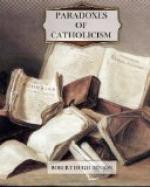She does not, then, want merely the life of a prosperous human state, whether monarchy or republic. There are times indeed in her history when such an accompaniment to her real existence is useful to her effectiveness; and she has, of course, the right, as have other societies, to earthly dominions that may have been won and presented to her by her children. Or through her ministers, as in Paraguay, she may administer for a while the ordinary civil affairs of men who choose to be loyal to her government. Yet if, for one instant, such a responsibility were really to threaten her spiritual effectiveness—if, that is, the choice were really presented to her between spiritual and temporal dominion—she would let all the kingdoms of the world go in an instant, to retain her kingdom from God; she would gladly suffer the loss of all things to retain Christ.
And how is it possible to deny for one instant that her success has been startling and overwhelming—this fructification of Life by Death.
Are there any human beings, for example, who have been more effective and influential than her saints—men and women, that is to say, who have died daily, in order to live indeed? They have not, it is true, prospered, let us say, as business men, directors of companies, or government officials, but such a success is simply not her ideal for them, not their own ideal for themselves. That is precisely the kind of life to which they have, as a rule, determinedly and perseveringly died. Yet their effectiveness in this world has been none the less. Are any kings remembered as is the beggar Labre who gnawed cabbage stalks in the gutters of Rome? Are the names of any statesmen of, let us say, even a hundred years ago, reverenced and repeated as is the name of the woman of Spain called Teresa of Jesus who, four hundred years ago, ruled a few nuns within the enclosure of a convent? Are any musicians or artists loved to-day with such rapture as is God’s little troubadour, called Francis, who made music for himself and the angels by rubbing one stick across another?
Or, again, is any empire that the world has ever seen so great, so loyally united in itself, so universal and yet so rigorous as is that spiritual empire whose capital is Rome? Is there any nation with so fierce a patriotism as she who is Supernational? Earthly kings speak from their thrones and what happens? And an old man in Rome who wears three crowns on his head speaks from his prison in the Vatican and all the earth rings with it.
Has her policy, then, been so suicidal after all? From the world’s point of view it has never been anything else. Her history is but one long example of the sacrifice of human activities and earthly opportunities; she has expelled from her pulpits the most brilliant of her children, she has silenced or alienated the most eloquent of her defenders. She has cut off from herself all that she should have kept, and hugged to her arms all that she should have relinquished! She has never done anything but die! She never does anything but live!




